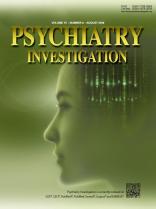Avoidant Insecure Attachment as a Predictive Factor for Psychological Distress in Patients with Early Breast Cancer
- 대한신경정신의학회
- Psychiatry Investigation
- 제15권 제8호
-
2018.08805 - 810 (6 pages)
- 7

Objective_To identify attachment insecurity as an associative factor with unresolved psychological distress 1 year after surgery in the early breast cancer (BC) population. Methods_One-hundred fourteen participants completed the Hospital Anxiety and Depression Scale (HADS) and the Experiences in Close Relationship (ECR-M36) questionnaire within 1 week (baseline) and at 1-year post-surgery (follow-up). Participants were categorized into the distress and the non-distress groups based on a HADS-total score cut-off of 15. Logistic regression analysis revealed predictive factors of distress at follow-up. Results_At baseline, 53 (46.5%) participants were found to be in the distress group. The degree of distress decreased over 1 year (p= 0.003); however, 43 (37.7%) showed significant remaining distress at follow-up. Baseline scores of the ECR-M36 avoidance [odds ratio (OR)=1.045, 95% confidence interval (CI)=1.002–1.090] and HADS-total (OR=1.138, 95% CI=1.043–1.241) were predictors of distress at follow-up. Conclusion_A substantial proportion of early BC patients suffer distress even one-year after surgery. Avoidant attachment appeared to be an influential factor on distress in early BC patients. Moreover, the finding that initial distress level could predict one at 1-year postoperation warrant a screening and management of distress along with BC treatment.
INTRODUCTION
METHODS
RESULTS
DISCUSSION
(0)
(0)